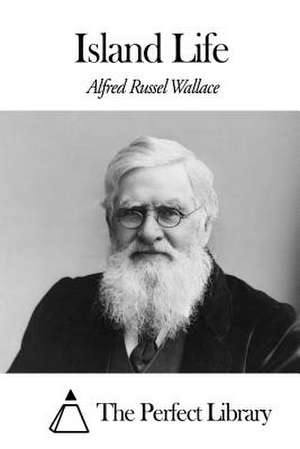Island Life
Autor Alfred Russel Wallace Editat de The Perfect Libraryen Limba Engleză Paperback
| Toate formatele și edițiile | Preț | Express |
|---|---|---|
| Paperback (4) | 174.06 lei 3-5 săpt. | |
| CREATESPACE – | 174.06 lei 3-5 săpt. | |
| CREATESPACE – | 174.23 lei 3-5 săpt. | |
| Kessinger Publishing – oct 2008 | 384.36 lei 38-44 zile | |
| Cambridge University Press – 27 iun 2012 | 497.49 lei 6-8 săpt. |
Preț: 174.06 lei
Nou
Puncte Express: 261
Preț estimativ în valută:
33.31€ • 36.17$ • 27.98£
33.31€ • 36.17$ • 27.98£
Carte disponibilă
Livrare economică 01-15 aprilie
Preluare comenzi: 021 569.72.76
Specificații
ISBN-13: 9781507604786
ISBN-10: 1507604785
Pagini: 438
Dimensiuni: 152 x 229 x 23 mm
Greutate: 0.58 kg
Editura: CREATESPACE
ISBN-10: 1507604785
Pagini: 438
Dimensiuni: 152 x 229 x 23 mm
Greutate: 0.58 kg
Editura: CREATESPACE
Notă biografică
Alfred Russel Wallace was an English naturalist, explorer, geographer, anthropologist, biologist, and illustrator who lived from 8 January 1823 to 7 November 1913. His own development of the theory of evolution through natural selection is what made him most famous. Charles Darwin's earlier papers on the subject were also excerpted in his 1858 paper, which was published in the same year. In response, Darwin rapidly wrote an abstract of the "great species book" he was composing, which he then published in 1859 as "On the Origin of Species. Beginning in the Amazon River basin, Wallace conducted considerable fieldwork. The Wallace Line, which divides the Indonesian archipelago into two distinct parts and is now known as the Wallace Line, was discovered by him while conducting fieldwork in the Malay Archipelago. In the western portion, where the animals are large and of Asian origin, and in the eastern portion, where the fauna reflects Australasia. He is frequently referred to as the "father of biogeography," or more specifically, of zoogeography, and was thought to be the foremost authority on the geographic distribution of animal species in the 19th century.
Cuprins
Preface; Part I. The Dispersal of Organisms: 1. Introductory; 2. The elementary facts of distribution; 3. Classification of the facts of distribution; 4. Evolution as the key to distribution; 5. The powers of dispersal of animals and plants; 6. Geographical and geological changes; 7. Changes of climate which have influenced the dispersal of organisms; 8. The causes of glacial epochs; 9. Ancient glacial epochs, and mild climates in the Arctic regions; 10. The earth's age, and the rate of development of animals and plants; Part II. Insular Faunas and Floras: 11. The classification of islands; 12. Oceanic islands; 13. The Galapagos Islands; 14. St Helena; 15. The Sandwich Islands; 16. Continental islands of recent origin; 17. Borneo and Java; 18. Japan and Formosa; 19. Ancient continental islands; 20. Anomalous islands: Celebes; 21. Anomalous islands: New Zealand; 22. The flora of New Zealand; 23. On the Arctic element in south temperate floras; 24. Summary and conclusion; Index.
Descriere
Descriere de la o altă ediție sau format:
First published in 1880, this wide-ranging study of island life addresses important questions of nineteenth-century biology and geography.
First published in 1880, this wide-ranging study of island life addresses important questions of nineteenth-century biology and geography.
